FAQs
Our FAQ section contains answers to a lot of commonly asked questions about our products, as well as general sterilisation and infant related queries. Use the options below to find the answer to your question.
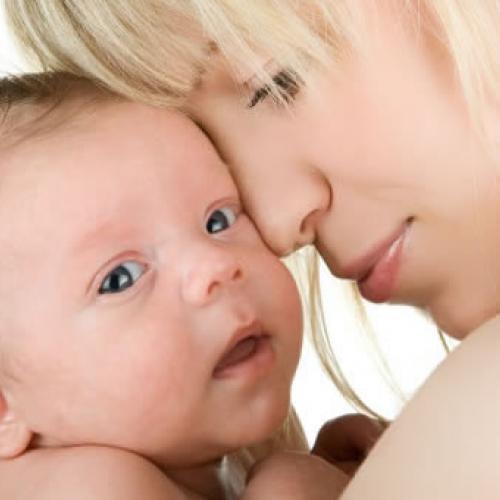
Please follow this instructions to do the Cold Water Method of sterilising with the Milton Sterilising Fluid:
1. CLEAN
Wash thoroughly bottle, teats and breastfeeding equipment in warm soapy water, then rinse in cold water.
2. PREPARE THE SOLUTION
Fill your unit with 5L of cold water, add 30 ml (one capful) of Milton Sterilising Fluid (dilution at 0.6% v/v)
3. ADD ITEMS
Immerge in the Milton Solution all bottles and accessories. Ensure that no air bubble is trapped inside the bottles. Close the lid and in just 15 minutes everything is ready to use. Wash your hands beofre taking the accessories out of the solution. Shake off any excess solution. There is no need to rinse. Items can stay in the solution until needed. Renew the solution every 24 hours.
Items are ready for use after just 15 minutes of complete immersion in the Milton solution but can be left soaking for up to 24 hours. Items can be added and removed to and from the solution throughout the day as and when they are needed.
Bottles should be filled immediately after removal from the Milton solution. Teats should be covered.
All the Milton products will kill Candida albicans (the agent responsible for thrush).
Just follow these simple 3 steps.
How to use?
1. CLEAN
Wash bottle, teat, breastfeeding equipment in warm soapy water, then rinse in cold water.
2. PREPARE SOLUTION
Fill your unit with 5L of cold water, add 1 Milton Tablet. Let the tablet fully dissolve
3. ADD ITEMS
Close the lid and in just 15 minutes everything is ready to use. No need to rinse. Items can stay in the solution until needed. Renew the solution every 24 hours.
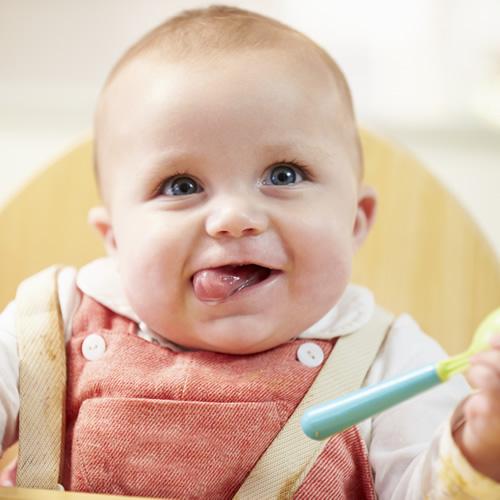
Germs
Methicillin Resistant Staphylococcus Aureus - or MRSA as it is more commonly known, is a form of the staphylococcus bacteria that have become very resistant to antibiotics. To be able to protect against MRSA, it is imperative that as much as possible is understood about the bacteria and its activity.
It is estimated that approximately 30% of the population are colonised (when bacteria are present, but not causing an infection) with Staphylococcus aureus - most often carried on the skin or in the nose of healthy people. It is a common cause of skin infections such as pimples & boils, which are normally treated without antibiotics. Approximately 1% of the population is colonised with the more lethal form, MRSA, which although linked to hospital deaths, has no ill effect on a healthy individual.
However, it becomes lethal when it gets beneath the skin and infects people who have a weak immune system - the very young and the very old; or those who are tired and run down, ill, or have had some kind of surgery. People in hospital are particularly vulnerable as the bacteria are transmitted through physical contact and easily spread from person to person.
Both MRSA and Staphylococcus aureus are particularly vulnerable to disinfectants and the application of simple hygiene routines will do much to prevent their spread.
Milton advises using the following scientifically proven methods;
- Clean your hands regularly.
- Clean your immediate surroundings regularly - particularly when away from the home and travelling.. Applications are endless and include disinfecting areas such as public toilet seats, door handles, high chairs, caravans etc
These products have been developed from the platform of Milton's six decades of clinical evidence, proving its efficacy in killing harmful bacteria, fungi and viruses. Effective and suitable even to babies, it makes Milton Sterilising Fluid and Tablets, as well as the Antibacterial Surface Spray the disinfectants of choice in preventing the spread of MRSA.
In the mature immune system, yes they do. This is the principle upon which many immunisations work whereby a small amount of the disease-causing organism is introduced to enable the body to create protective anti-bodies, which remain in the blood stream. The immunisation that babies will receive during their first few months will help them to establish antibodies that will help fight a range of baby illnesses. However it makes sense to try to do all you can to prevent babies getting these illnesses, especially those that can cause gastroenteritis. Therefore it is a good thing to give the extra protection that their immune system cannot provide until they are older and stronger.
When a baby is born, it has certain antibody-like proteins called immunoglobulins, which it has received through the placenta. Another very important one is received from its mother after it is born. This immunoglobulin is called IgA and is present in the colostrum, the first part of mother’s milk. It places itself on the mucus membranes of the baby’s alimentary canal in order to help fight the bacteria that can cause gastroenteritis. Babies do not start to produce their own IgA until around 6 months of age. By their first birthday they have between 15 – 17% of their adult level.
Milton Antibacterial Surface Wipes can be used without rinsing. The active ingredient of the wipes is ethanol, which is alcohol. It disinfects quickly and leaves no residue after use.
The Milton Antibacterial Surface Spray is suitable to clean all surfaces in the house, even in the kitchen. It will leave a gentle fragrance and limit the risk of germ transmission.
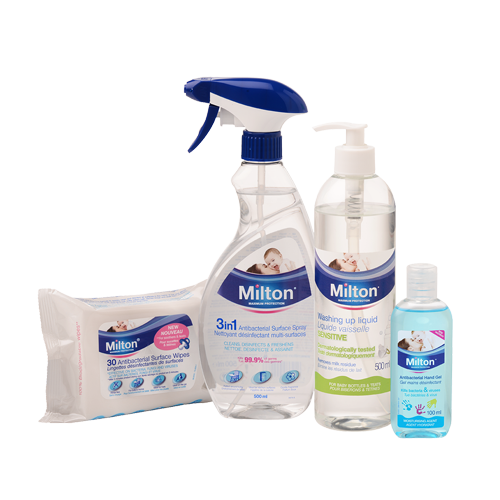
Products
Milton Wipes are 100% biodegradable. However, it takes time for the fabric to break down. It may therefore block the toilets.
In conclusion, do not flush the Milton wipes down the toilets.
No. To sterilise infant feeding utensils they have to be immersed in a solution which is compatible to the item being sterilised. Also the item has to be sterilised on the inside as well as the outside. However, the Spray and Wipes can be used to disinfect surfaces.
No because the use of alcohol based products is not recommended on children under 2. At that age the skin of the child is not mature and there is a risk of the alcohol getting in the child’s blood stream.
Yes, the Wipes are 100% biodegradable. This means that they will naturally decompose. They are however, not suitable to flush down the toilet.
The Wipes are designed for use on surfaces only. Because of the alcohol content of the wipe, if the skin was sore or broken, it would cause a stinging sensation. Also alcohol has a drying effect on skin. The Milton Wipes should never be used on baby skin or as a nappy change wipe.
The Milton Hand Gel contains 62% ethanol and 10% isopropanol which enables it to evaporate within 30 seconds on contact with hands. At this concentration germ kill is almost instantaneous. The gel also contains a moisturiser which prevents the hands drying out during the rapid evaporation.
No. The Antibacterial range has been designed to be used on surfaces or the skin (Gel only) and two of them (wipes and gel) are alcohol based and achieve their germ kill very quickly. As with any surface cleaner, they do not sterilise as it is not possible to sterilise a surface. The spray is very effective in cleaning and disinfecting kitchen and nursery surfaces.
All the Milton products will kill Candida albicans (the agent responsible for thrush).
The Milton Antibacterial Hand Gel should not be used on children below the age of 3 because of its high alcohol content. Babies skin is not fully developed and it is important to use on their skin hypoallergenic formulas.
If you travel with a Solo full of water you have to ensure that you keep up upright as water could leak out from the valve.
The Milton Combi steriliser is universal and will take 5 wide neck bottles of any brand.
The Milton Baby Bottle Cleaner is clinically tested to remove all milk residue on baby accessories. It cleans and degreases as well as a normal washing up liquid. It is not formulated to kill germs therefore it is still important to sterilise all baby equipment after cleaning. To sterilise well, it is important to wash all items thoroughly.
The Combi has been designed to be washed either by hand or in the dishwasher. In the lid you can untwist the submerger to wash both parts better.
The Solo has been designed to be washed either by hand or in the dishwasher. In the lid you can untwist the submerger to wash both parts better.
It is recommended to clean it and dry well once a week.
The Milton Baby Bottle Cleaner is formulated to be used on sensitive hands and is dermatologically tested. Its gentle fragrance free formula is ideal for all the family washing up and will protect your skin.
Yes you can rinse them under clear water and leave them to dry on a clean surface. They will become hard ; you will just need to put them under water again when you will need to re-use them.
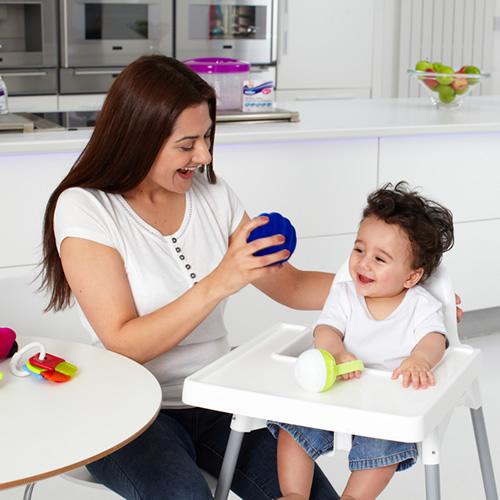
Hygiene at home
No. Bleaches are usually concentrated to between 5 and 10% and can contain thick detergents to withstand rinsing and flushing. They are dangerous to handle at this concentration. They will leave chemicals behind on the surface which will chemically contaminate and taint food. The bleach may also harm the work surface. Although Milton is less concentrated, it will still have the same germ killing effect as bleach.
Milton Antibacterial Surface Wipes can be used without rinsing. The active ingredient of the wipes is ethanol, which is alcohol. It disinfects quickly and leaves no residue after use.
The Milton Antibacterial Surface Spray is suitable to clean all surfaces in the house, even in the kitchen. It will leave a gentle fragrance and limit the risk of germ transmission.
You don't have to have a baby to use Milton. Milton Sterilising Fluid can be used to disinfect kitchen work surfaces, chopping boards, wiping out fridges, microwaves, storage containers, pet bowls and bins. It can also be used to soak fruit and vegetables where the microbiological safety of such items is suspect. For more information, click here
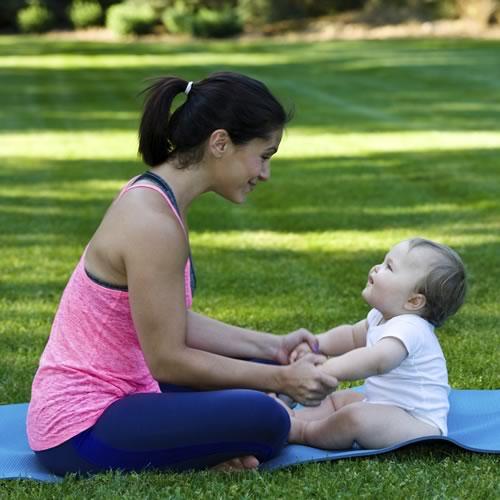
Hygiene outdoors
You don't have to have a baby to use Milton. Milton Sterilising Fluid can be used to disinfect kitchen work surfaces, chopping boards, wiping out fridges, microwaves, storage containers, pet bowls and bins. It can also be used to soak fruit and vegetables where the microbiological safety of such items is suspect. For more information, click here
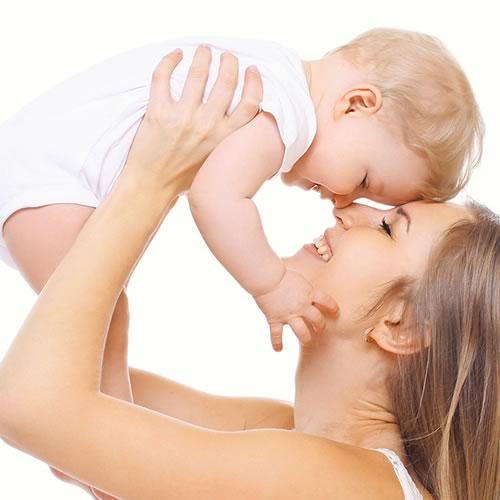
Sterilisation
Until a baby’s first birthday, they are extremely vulnerable to infections because of their significantly weaker immune system. By their first birthday, a baby will have only acquired 15-17% of their natural anti-bodies called immunoglobulins. As a loving parent, it is your duty to always protect them, especially through these critical first 12 months of their lives.
Some of the risks include the development of mild thrush, a major concern is vomiting and diarrhoea, which can be caused by Rotavirus and even E.Coli. Campylobacter is a virus that can also be picked up from cats and dogs.
Anything that goes, or potentially might go into your baby’s mouth, needs to be sterilised!
Milk provides a perfect environment in which bacteria can grow, which puts your baby’s feeding equipment especially at risk!
However, do not fear! Because sterilisation is your best defence against all of these and more.
Parents should sterilise all feeding utensils from birth up until the baby's 1st birthday and bottles and teats for as long as baby is using them.
Official publications give the following definitions: (ref. Collins, C. H. and Lyne,P. M., 1976)
Sterilisation; This is an absolute term meaning complete destruction or removal of all viable micro-organisms.
Disinfection; Describes the elimination or destruction of micro-organisms, but not usually bacterial spores. Generally applied to the process of making inanimate objects free from infection and safe to handle.
Antisepsis; Destruction of micro-organisms, but not bacterial spores, on skin, mucus membrane or living tissue to prevent sepsis. Milton Fluid can be considered in terms of each of these actions depending on the specific situation or application.
Therefore a work surface can be wiped over with Milton to disinfect it by killing all 'live' bacteria, but it cannot be sterilised in this way. To sterilise an object it has to be scrupulously cleaned then soaked for the required time in a solution of Milton.
No. To sterilise infant feeding utensils they have to be immersed in a solution which is compatible to the item being sterilised. Also the item has to be sterilised on the inside as well as the outside. However, the Spray and Wipes can be used to disinfect surfaces.
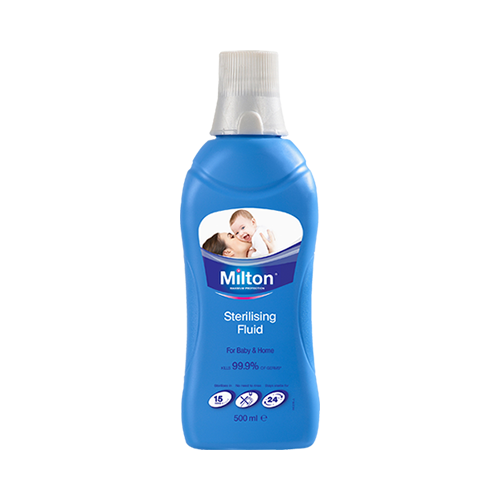
Sterilising fluid
Please follow this instructions to do the Cold Water Method of sterilising with the Milton Sterilising Fluid:
1. CLEAN
Wash thoroughly bottle, teats and breastfeeding equipment in warm soapy water, then rinse in cold water.
2. PREPARE THE SOLUTION
Fill your unit with 5L of cold water, add 30 ml (one capful) of Milton Sterilising Fluid (dilution at 0.6% v/v)
3. ADD ITEMS
Immerge in the Milton Solution all bottles and accessories. Ensure that no air bubble is trapped inside the bottles. Close the lid and in just 15 minutes everything is ready to use. Wash your hands beofre taking the accessories out of the solution. Shake off any excess solution. There is no need to rinse. Items can stay in the solution until needed. Renew the solution every 24 hours.
Because of the salt in the solution in the bottle, the child will usually spit the fluid out, or, at worst, be sick. If they are not sick, there should be no need to worry but a concerned parent can give the child a drink of milk. Because milk is a protein it will neutralise the Milton solution. The Milton Sterilising Fluid formula should be neutralised by the saliva proteins and break down into salt and water. However it is always best to seek medical advice or contact your GP to ensure complete safety.
Milton will sterilise as long as the requirements for chemical sterilisation with hypochlorites are carried out. These are:
(a) Scrupulous attention to pre-cleansing of the item to be sterilised
(b) Stability of the active agent
(c) That the article to be sterilised is of a material compatible with hypochlorite and is so constructed that it can be cleaned properly
The Milton Method of cleaning bottles and teats incorporates these requirements.
Stability.
Yes. The purification process during the manufacture of Milton ensures complete removal of all heavy metal ions, which would normally act as a catalyst to chemically break down many hypochlorites, causing instability. Therefore accurate levels of available chlorine can be obtained with Milton Sterilising Fluid.
Items are ready for use after just 15 minutes of complete immersion in the Milton solution but can be left soaking for up to 24 hours. Items can be added and removed to and from the solution throughout the day as and when they are needed.
Bottles should be filled immediately after removal from the Milton solution. Teats should be covered.
All the Milton products will kill Candida albicans (the agent responsible for thrush).
You don't have to have a baby to use Milton. Milton Sterilising Fluid can be used to disinfect kitchen work surfaces, chopping boards, wiping out fridges, microwaves, storage containers, pet bowls and bins. It can also be used to soak fruit and vegetables where the microbiological safety of such items is suspect. For more information, click here
No. As stated above, toxicity in hypochlorites is due to the by-product of their decomposition, sodium chlorate. With the heavy ions removed Milton decomposes into water and a small amount of sodium chloride (salt).
You can use a solution made up with Milton Sterilising Tablets or Fluid to clean all objects, floors and surfaces in your home with no need to rinse. The solution is totally food safe and can be used to disinfect fridges, chopping boards, plastic containers with no need to rinse.
Use this simple dilution:
Dilute 90 ml (3 capful) of Milton Fluid or 3 Milton Tablets in 5 litres of cold water (dilution at 1.8% v/v). Surfaces are disinfected after 15 minutes. There is no need to rinse even for surfaces in direct contact with food. The disinfecting solution is effective for 24 hours. After wiping you can leave to dry.
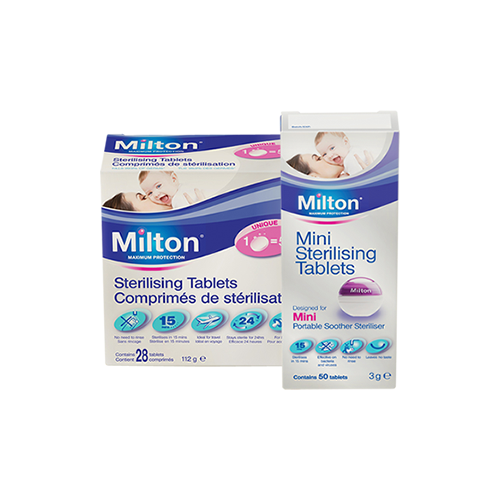
Sterilising tablets
Items are ready for use after just 15 minutes of complete immersion in the Milton solution but can be left soaking for up to 24 hours. Items can be added and removed to and from the solution throughout the day as and when they are needed.
Bottles should be filled immediately after removal from the Milton solution. Teats should be covered.
All the Milton products will kill Candida albicans (the agent responsible for thrush).
Just follow these simple 3 steps.
How to use?
1. CLEAN
Wash bottle, teat, breastfeeding equipment in warm soapy water, then rinse in cold water.
2. PREPARE SOLUTION
Fill your unit with 5L of cold water, add 1 Milton Tablet. Let the tablet fully dissolve
3. ADD ITEMS
Close the lid and in just 15 minutes everything is ready to use. No need to rinse. Items can stay in the solution until needed. Renew the solution every 24 hours.
You can use a solution made up with Milton Sterilising Tablets or Fluid to clean all objects, floors and surfaces in your home with no need to rinse. The solution is totally food safe and can be used to disinfect fridges, chopping boards, plastic containers with no need to rinse.
Use this simple dilution:
Dilute 90 ml (3 capful) of Milton Fluid or 3 Milton Tablets in 5 litres of cold water (dilution at 1.8% v/v). Surfaces are disinfected after 15 minutes. There is no need to rinse even for surfaces in direct contact with food. The disinfecting solution is effective for 24 hours. After wiping you can leave to dry.
